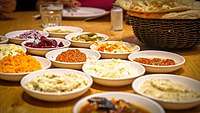Torshi
Torshi (Aramaic ܡܟ̇ܠܠ, :Arabic: مخلل mukhallal, Persian: ترشى torshi; Kurdish: ترشى Tirşîn, tirşî, trshin; Turkish: turşu; Greek: τουρσί toursí; Bulgarian: туршия turshiya; Bosnian, Croatian, Montenegrin, Serbian: turšija/туршија ; Albanian: turshi Hebrew: חמוצים, khamutsim; Macedonian: туршија) are the pickled vegetables of the cuisines of many Balkan and Middle East countries. The word turşu is ultimately derived from Persian torsh, which means 'sour'. In Turkic languages such as Turkish and Azerbaijani it is spelled turşu.
.jpg) Mixed pickles | |
| Course | Hors d'oeuvre |
|---|---|
| Place of origin | Afghanistan, Albania, Armenia, Azerbaijan, Bosnia and Herzegovina, Bulgaria, Croatia, Egypt, India, Iran, Iraq, Israel, Nepal, Jordan, Lebanon, Palestine, Pakistan, Serbia and Turkey |
| Region or state | Middle East and Balkans |
| Main ingredients | Vegetables, garlic, brine or vinegar |
Torshi is common in varieties of Middle Eastern cuisine such as Arab cuisine, Turkish cuisine, and Iranian cuisine. Iran boasts a great variation of hundreds of different types of torshi according to regional customs and different events. In some families, no meal is considered complete without a bowl of torshi on the table. In Bulgarian cuisine, the most popular types are tsarska turshiya ("king's pickle") and selska turshiya ("country pickle"). Toursi is a traditional appetizer (meze) to go with arak, rakı, ouzo, tsipouro, and rakia. In some regions the torshi water (turşu suyu) is also drinkable and very popular in Turkey.
Making torshi at home is still a widespread tradition during the autumn months, even in cities. Torshi is often served in restaurants or it can be bought ready to eat from supermarkets.
Recipes
Torshi is made with garlic, chili peppers, celery, cauliflower, carrots, beets, shallots, cabbage, aubergines (eggplant) and other vegetables, and dried aromatic herbs pickled in vinegar or brandy, salt, and different spice mixtures, which usually include whole black peppercorns, ginger, etc. Persian-style torshi includes more vinegar, while Turkish style turşu includes more salt as an antibacterial agent.
Torshi liteh is made with eggplants and herbs (parsley, coriander, mint, tarragon, basil). Eggplants are baked in the oven, put in a glass jar with herbs and vinegar, and stored in a cool, dry place for two to three months.
Tsarska turshiya is made with cauliflower, red peppers, carrots, and celery. The vegetables are mixed with some salt and sugar and left overnight. The next day the juice is mixed with vinegar and boiled for several minutes. The vegetables are put in glass jars and pressed down with cherry twigs and a round river stone, then the jars are filled with the cooled pickle marinade.
Selska turshiya is made with green peppers, green tomatoes, carrots, cauliflower, cabbage, and celery. The vegetables are put in a container, pressed down with some twigs and a stone, and a marinade made of salt, vinegar and water is poured on. The pickles are left to ferment.
See also
- Giardiniera – An Italian relish of pickled vegetables in vinegar or oil
- Jangajji – Type of Korean non-fermented pickled vegetable side dish
- List of pickled foods – List of links to Wikipedia articles on pickled foods
